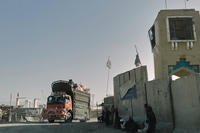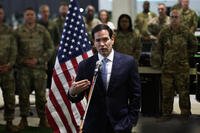The Pentagon on Friday stood by its decision to conduct a clandestine disinformation campaign in the Philippines in 2020 that aimed to sow doubt about China's COVID-19 vaccine during the height of the global pandemic -- a campaign that was first revealed in a bombshell report by Reuters.
The U.S. military launched the disinformation campaign following a decision by then-Defense Secretary Mark Esper to loosen restrictions on such operations, and used phony online accounts posing as Filipinos in an effort "to discredit China's Sinovac inoculation -- payback for Beijing's efforts to blame Washington for the pandemic," Reuters reported. At the time, the Philippines was struggling to vaccinate its population and had one of the worst death rates in the region.
The Philippines disinformation campaign marks an unusual use of military power in a country that has often been a U.S. ally in a strategically crucial region and at a time of great public health risks. Lisa Lawrence, a Defense Department spokeswoman, did not deny Reuters' reporting on the operation, which was done under the administration of former President Donald Trump and continued for some time under the Biden administration.
Read Next: The Army's Recruiting Problem Is Male
The Pentagon "conducts a wide range of operations, including operations in the information environment (OIE), to counter adversary malign influence" and "this process is deliberate, methodical, and comprehensive," Lawrence said in a statement. "The DoD uses a variety of platforms, including social media, to counter those malign influence attacks."
Lawrence also echoed Reuters' reporting, saying, "China [in 2020] initiated a disinformation campaign to falsely blame the United States for the spread of COVID-19."
Reuters found at least 300 accounts on X, formerly Twitter, "that matched descriptions shared by former U.S. military officials familiar with the Philippines operation."
The posts from those accounts "centered on the slogan #Chinaangvirus," which in the Philippine language Tagalog means "China is the virus." They often focused on giving credence to the false claim that, since vaccines sometimes contain pork gelatin, the Chinese-made shots could be forbidden for Muslims under Islamic law.
The social media activity began during Trump's administration when Esper signed a secret order that made it easier for commanders to compete with Russia and China by enabling them to bypass the State Department when conducting information warfare against the two countries, Reuters reported.
The report also noted that the program "continued months into Joe Biden's presidency ... even after alarmed social media executives warned the new administration that the Pentagon had been trafficking in COVID misinformation."
Experts have long objected to the use of vaccines and vaccination campaigns as part of military operations, arguing that they not only lead to a loss of trust and confidence in vaccines as a whole but have also endangered medical workers.
Perhaps the biggest outrage came after it was revealed in 2011 that the CIA used a fake hepatitis vaccination program as part of its efforts to track down and kill Osama bin Laden, who was hiding in Pakistan.
The ruse led to outrage from doctors worldwide and a promise in 2014 from the CIA not to use immunization programs as cover for its operations in the future.
However, the damage had been done, and backlash against unrelated polio vaccination efforts in the region took hold. Attacks against vaccination workers continue to this day. Pakistan and Afghanistan are now the only two countries that have yet to be declared free of wild poliovirus type 1.
Related: Pentagon Complied with COVID-19 Waiver Rules According to Watchdog But Services Moved Slowly













